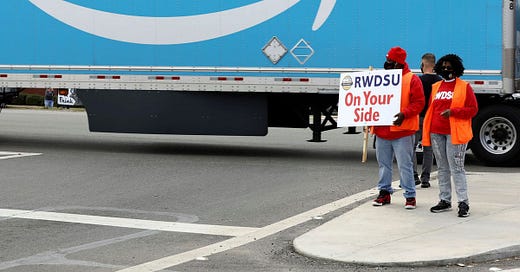First Impressions Of The Hearing Officer's Report In The Amazon Election
The union is probably getting a second election if it wants one.
News broke yesterday evening that the NLRB hearing officer, after sitting in review of the union’s objections to its loss in the Amazon election, is officially recommending that the election results be set aside and a second election be ordered due to Amazon’s illegal misconduct in the “laboratory conditions” of the Board’s election process. We do not yet know what specifically the hearing officer found objectionable, but the laboratory conditions standard—which requires that “an experiment” be conducted “under conditions as nearly ideal as possible, to determine the uninhibited desires of the employees”—is, in practice, not a very high one once unlawful conduct has been demonstrated.
First, some background on the process. The hearing officer is a career Labor Board employee in a regional office who reviews the objections of the losing party. Their recommendation is almost always upheld and ordered by the Regional Director. That decision can be appealed to the full Board in D.C., and then a federal circuit court. With Democratic appointees obtaining a majority on the Board as soon as William Emanuel’s term expires on August 27 (his replacement, union-side labor lawyer David Prouty, has already been confirmed by the Senate), the chances are very good that the Board will uphold a decision directing a re-run election. And as for the more harrowing review in federal court if (and it’s a big if) the union were to win the second election and Amazon subsequently refuses to bargain), my guess is that Region 10 in Atlanta—which is very aware of the media attention given to this case, as well as Amazon’s unlimited ability to contest the Board’s orders to the end—will put forward a near-bulletproof decision clearly demonstrating the company’s unlawful behavior. So all of this is to say that the union is probably getting a second election if it wants to wait for one.
I’ve seen some speculate about whether a Gissel bargaining order is in the picture. The answer to that is “probably not.” The hearing officer did not recommend an order directing Amazon to bargain, and the union did not appear to ask for one in the lead-up. The Regional Director is highly unlikely to go above and beyond what the hearing officer recommended, especially given that (to my knowledge, at least) the union never approached management with its card majority and demanded the employer bargain with it, which is the usual factual trigger for a Gissel order. Instead, the union simply filed with the Board for an election. This would make it difficult to determine when, if ever, the union possessed a clear majority of the bargaining unit, and as anyone knows from following the election process, the exact size of the workforce was always in flux and eventually conceded to be a wall-to-wall unit.
Moreover, the facts aren’t here for the kind of Gissel case that will survive a skeptical set of judges. There has apparently been severe turnover in the facility, including among the original majority claimed by the union. As I have discussed, courts are likely to reject Gissel bargaining orders where there has been a significant change in the voting personnel. The union also never possessed the sort of overwhelming supermajority in cards that can make a court confident that the bargaining unit consists of an un-coerced majority of the workforce. And of course, the vote wasn’t close. My judgment is that the D.C. Circuit or 11th Circuit—the two potential forums for which the Board’s order can be reviewed—would be very unlikely to uphold a Gissel order in this case if the Board sought one, but all of the relevant parties seem to be aware of this. Hence, the sought-and-recommended re-run election.
(For reasons too numerous to recount here, I think the Gissel framework is a very bad one for enforcing the policy goals of the National Labor Relations Act. You can read here about my preference for its analytical predecessor, the formidable Joy Silk bargaining order.)
Winning a re-run election is not easy. Unions these days that actually proceed to the re-run win just 40 percent of the time (down from the 66 percent who win the initial election), and who knows how many pull the petition and give up. With heavy turnover apparently a built-in feature of Amazon’s business model, organizing the Bessemer facility (or any other in the U.S.) remains a Herculean task. However, it is important that the Board enforces the NLRA where illegal misconduct has occurred. The agency desperately needs the monetary fines provision of the PRO Act currently included in the reconciliation bill being considered in Congress, but at least the Labor Board still seems able to tell a strike from a ball when calling a big game.




